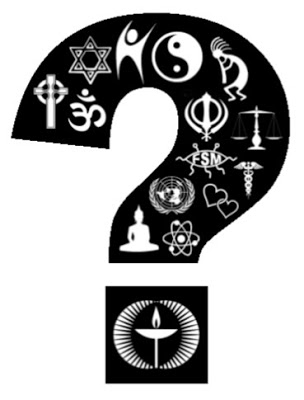
The Membership Committee of the congregation I serve is wrestling with the question of how to explain Unitarian Universalist spirituality to newcomers (and old-timers). Since I’m unable to attend their retreat this Saturday (since I’ll be at our Board’s retreat!), I wrote something up for them to consider. Here’s what I said:
I’d start by saying that we are not as unique as we sometimes think and say we are – progressive Christians too, for instance, encourage people to think and explore and search their own lives in coming to understand God. We are, however, generally more expansive in our encouragement of that search. Using a video game analogy, ours is more of an “open world” model rather than one that restrictively directs your movement. I would also note that I do not believe that “spirituality” is about what someone passively “believes” but, instead, how a person actively engages their inner and outer world.
That said, there is a line in the hymn, “We Laugh, We Cry” (#355) which says that we believe, “even to question, truly is an answer.” An important part of the spiritual grounding of our faith tradition, as I understand it at least, is precisely this encouragement to seek for truth and meaning. This is not the same as saying, “UUs can believe anything we want.” That’s way too simplistic. It is to say, however, that our faith encourages us to challenge ourselves to look into our own lived experience (equally with the insights of religion, science, and the arts) as a source of understanding “the twin realities of being born and having to die” (as the Rev. Forrest Church put it). This is no small thing. Ours is, at its best, an active faith that calls on us to examine, to re-examine, and to keep on examining our understanding of the universe and our place in it. One way to describe the spirituality of Unitarian Universalism is that it calls on us to become comfortable in the discomforting place of not-knowing.
So no, you can’t “believe anything you want.” In the first place, “belief” is not, for UUs, the core of “spirituality.” In the second, we are encouraged to actively engage ourselves and the world in a free search for meaning; to then engage with others in open, inquisitive dialog about what they’re discovering in their searching; and to then arrive at our own tentative beliefs. Unitarian Universalist spirituality truly understand and engaged, ought to lead us to the place so many of our youth model for us during their Coming of Age service – “this is what I believe now, but I know my beliefs will change over time.”
One other aspect of our faith tradition’s spiritual core – it is not enough to engage in this search for truth and meaning. We then must strive to apply our discoveries to the way we live our lives in the world.
One final, general, observation – this is not, in my experience, the way a lot of UUs understand and experience our faith. Far too many, it seems to me, come to UUism having already decided on the “answers to life’s big questions,” and have no real interest in looking any further. We come, many of us and maybe even the majority of us, to have our understandings affirmed rather than challenged; we want our already established biases reinforced instead of re-examined. In this we are absolutely no different than the majority of other religious traditions we humans have ever create.
So here’re three “elevator speeches” about the spiritual core of Unitarian Universalism:
· Unitarian Universalism challenges us to hold our beliefs lightly, always ready to let go as we discover new and deeper truths.
· Unitarian Universalist spirituality is found in the free and ongoing search for truth and meaning, within the context of a community of open-minded seekers.
· Unitarian Universalist spirituality is an active search for meaning in life as we experience it, which we then strive to put into practice in life as we live it.
I hope it need not be said, but this is, of course, a provisional answer …
